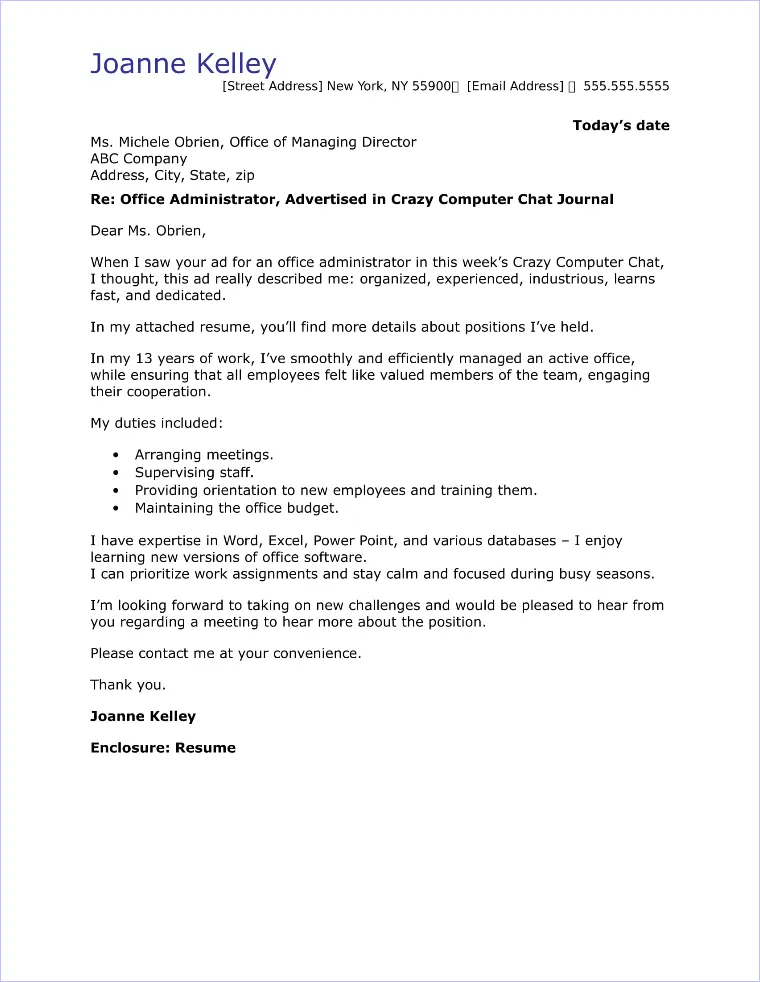Understanding the Importance of a Cover Letter for Administrative Jobs
In the competitive landscape of administrative jobs, a well-crafted cover letter is your first opportunity to make a lasting impression. It serves as a crucial introduction to your resume and a chance to showcase your personality, skills, and enthusiasm for the position. While a strong resume lists your qualifications, a cover letter provides the narrative, allowing you to connect with the hiring manager on a personal level and demonstrate why you’re the ideal candidate. It’s not just about repeating what’s already on your resume, but rather, elaborating on your experiences and demonstrating a genuine interest in the specific role and company. This is where you can truly shine and set yourself apart from other applicants.
Why a Cover Letter Matters
A cover letter matters because it allows you to tell a story beyond your qualifications. It provides context to your experience, explaining how your skills and accomplishments align with the job requirements. A cover letter demonstrates your communication skills, attention to detail, and genuine interest in the specific role and company. Furthermore, it allows you to address any potential gaps in your resume or highlight specific experiences that might not be immediately apparent. It’s a chance to show off your personality and passion, making you more than just a list of qualifications on a page. For administrative roles, this is especially important, as these positions often require excellent written communication skills.
Highlighting Your Skills
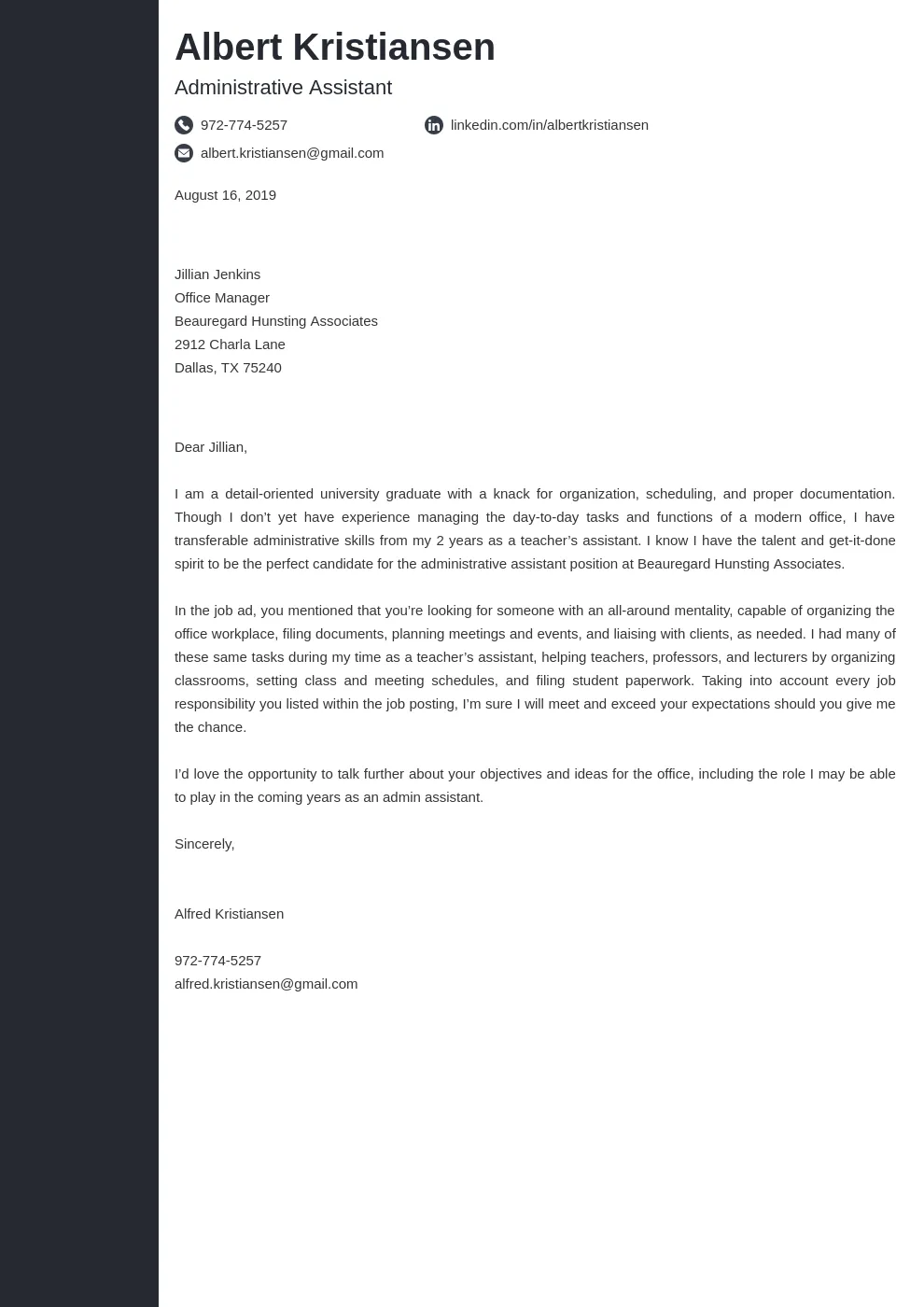
Your cover letter is the perfect place to highlight the specific skills that make you a strong administrative candidate. Focus on both hard and soft skills. Hard skills are the technical abilities you’ve acquired, such as proficiency in Microsoft Office Suite, data entry, or managing office equipment. Soft skills, on the other hand, encompass interpersonal abilities like communication, organization, problem-solving, and time management. Give examples of how you’ve used these skills in previous roles to achieve positive outcomes. Instead of just listing skills, provide brief anecdotes that illustrate how you’ve used them effectively. For instance, describe how you streamlined an office process or improved communication within a team, showcasing how you can apply your skills to benefit the prospective employer.
Essential Components of an Administrative Cover Letter
A well-structured cover letter for an administrative job includes several key components that work together to create a compelling narrative. These components, when properly addressed, show the recruiter your communication skills and attention to detail. These are not only essential for administrative roles, but they also help you present yourself in the best possible light. Paying attention to each section ensures you showcase your strengths effectively and make a strong first impression. Consider that your cover letter is more than just an introduction; it’s your chance to make the recruiter want to learn more about you.
Contact Information and Date
Start your cover letter by including your full name, address, phone number, and email address at the top left. On the right-hand side, include the date. This is a professional standard and ensures the hiring manager can easily reach you. Using a professional email address is crucial; avoid anything that sounds casual or unprofessional. If you are applying for a specific position and know the hiring manager’s name, address them directly. Otherwise, use a general salutation like “Dear Hiring Manager.” Remember to make sure the contact information is accurate and up-to-date.
The Salutation
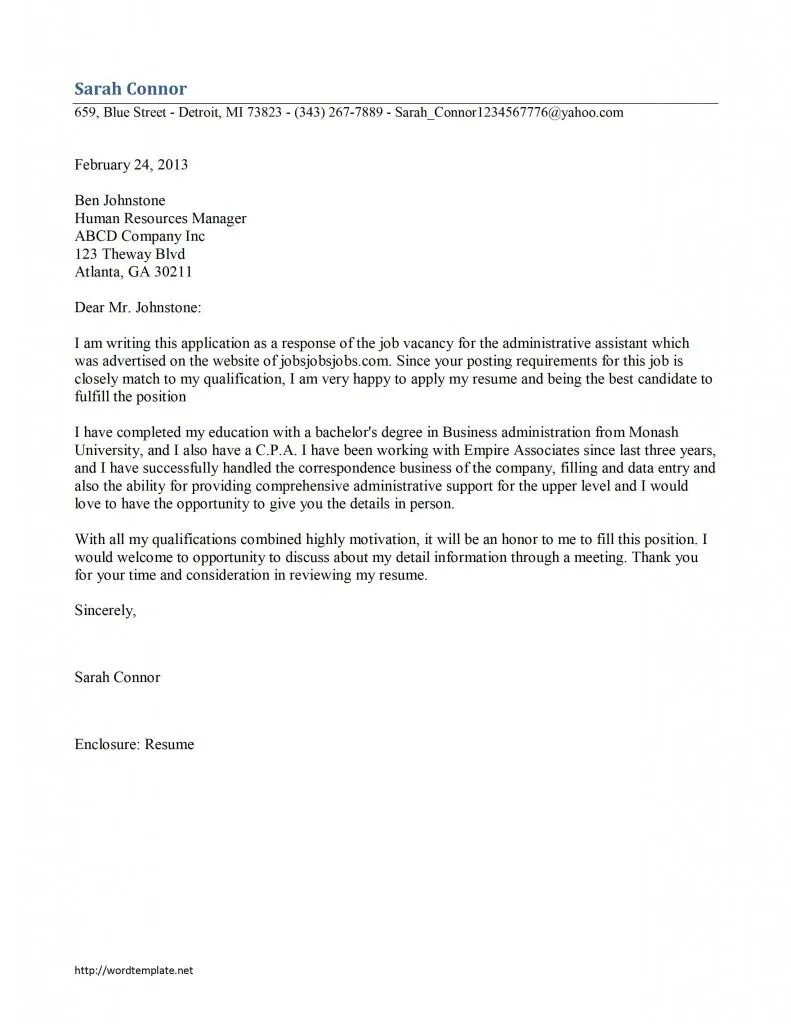
Address the hiring manager by name whenever possible. If you don’t know the name, use a professional salutation like “Dear Hiring Manager.” Avoid generic greetings like “To Whom It May Concern.” Researching the hiring manager’s name demonstrates your initiative and attention to detail. Always use a formal salutation to maintain a professional tone. If you found the job posting on a specific website, you could try to find the name of the hiring manager on LinkedIn or the company website. This small effort can make a big difference in showing your genuine interest and commitment to the role.
Crafting a Compelling Opening
The opening paragraph is your chance to immediately grab the reader’s attention. State the specific position you are applying for and how you learned about the opportunity. Briefly mention a key skill or accomplishment that aligns with the job requirements to immediately show your value. Express your enthusiasm for the company and the role. Show your genuine interest in the company and demonstrate that you’ve done your research. This opening sets the tone for the rest of the letter and encourages the hiring manager to continue reading. Consider writing a strong, attention-grabbing statement that highlights your key strengths.
Highlighting Relevant Experience
In the body of your letter, describe your relevant experience and how it aligns with the job description. Focus on specific achievements and use quantifiable results whenever possible. Use the STAR method (Situation, Task, Action, Result) to provide context for your accomplishments. Relate your skills and experience to the specific requirements outlined in the job posting. This section is where you truly demonstrate your ability to perform the job. Include specific examples and tailor your descriptions to match the role’s needs. Ensure your experience demonstrates a clear understanding of the requirements and expectations of an administrative position.
Quantifying Your Accomplishments
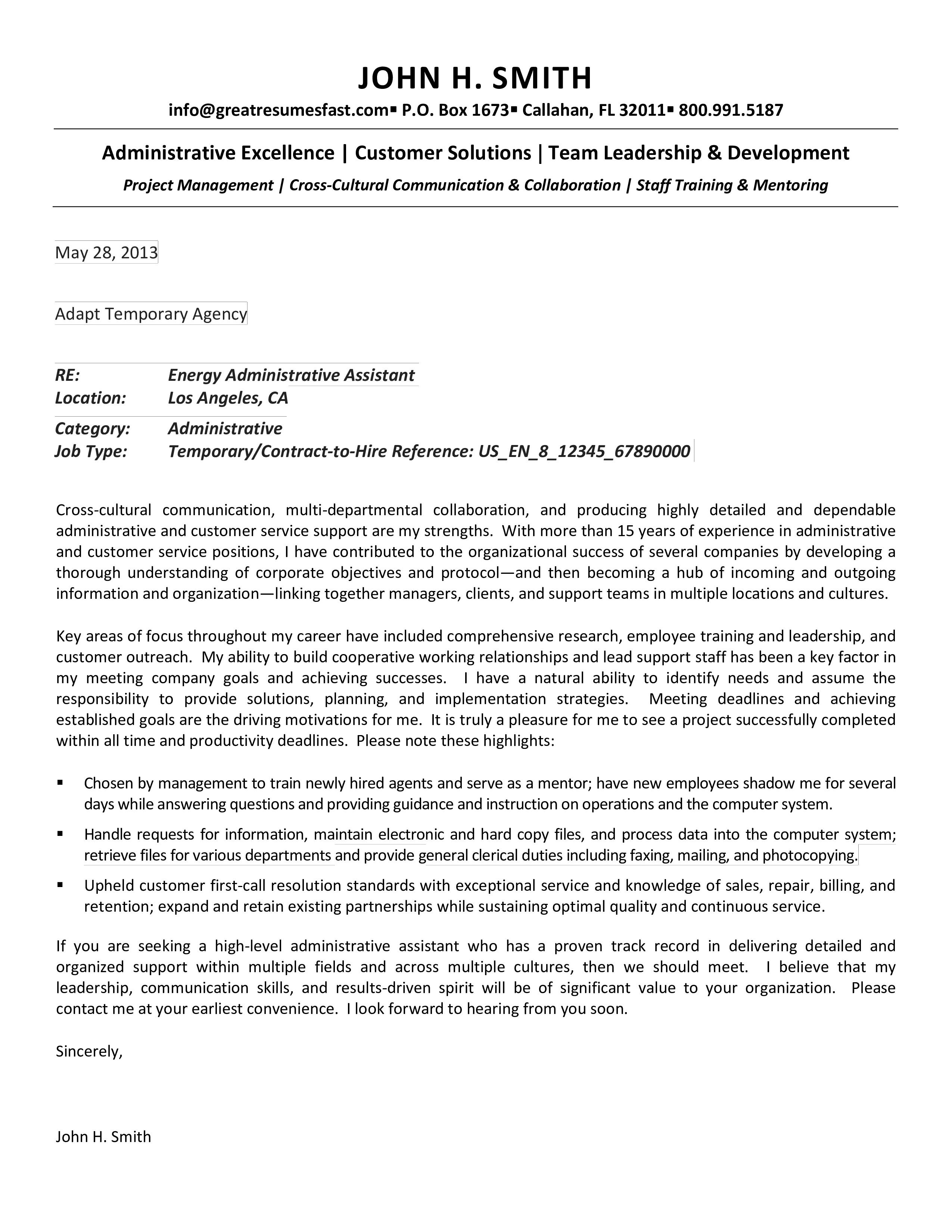
Whenever possible, quantify your accomplishments using numbers or percentages. Instead of saying you “managed projects,” state that you “managed projects, resulting in a 15% reduction in costs.” This provides concrete evidence of your abilities and makes your achievements more impactful. Quantifiable results are more convincing and allow the hiring manager to easily understand the impact you have made in previous roles. Using numbers makes your experience more credible and demonstrates your ability to contribute to the success of the company. Always make sure your numbers are accurate and align with the provided job description.
Tailoring Your Cover Letter
Customize each cover letter for the specific job and company. Research the company’s values, mission, and culture, and incorporate this knowledge into your letter. Demonstrate that you understand the company’s needs and how your skills can contribute to its success. This level of customization shows that you are genuinely interested in the role and have taken the time to understand the company. Tailoring your cover letter to match the job description shows that you’re invested in the role and meet its unique requirements. This personalization sets you apart from those using a generic template.
Showcasing Soft Skills
Administrative roles rely heavily on soft skills. Highlight your communication, organizational, and problem-solving skills with specific examples. Describe how you have used these skills to manage tasks, resolve conflicts, and contribute to a positive work environment. For example, you might describe how you improved communication within a team or streamlined a process to improve efficiency. Showcasing these abilities demonstrates that you’re able to handle various administrative tasks and contribute to a productive workplace. Focus on showing, not just telling, to make these skills apparent to the hiring manager.
Demonstrating Your Enthusiasm
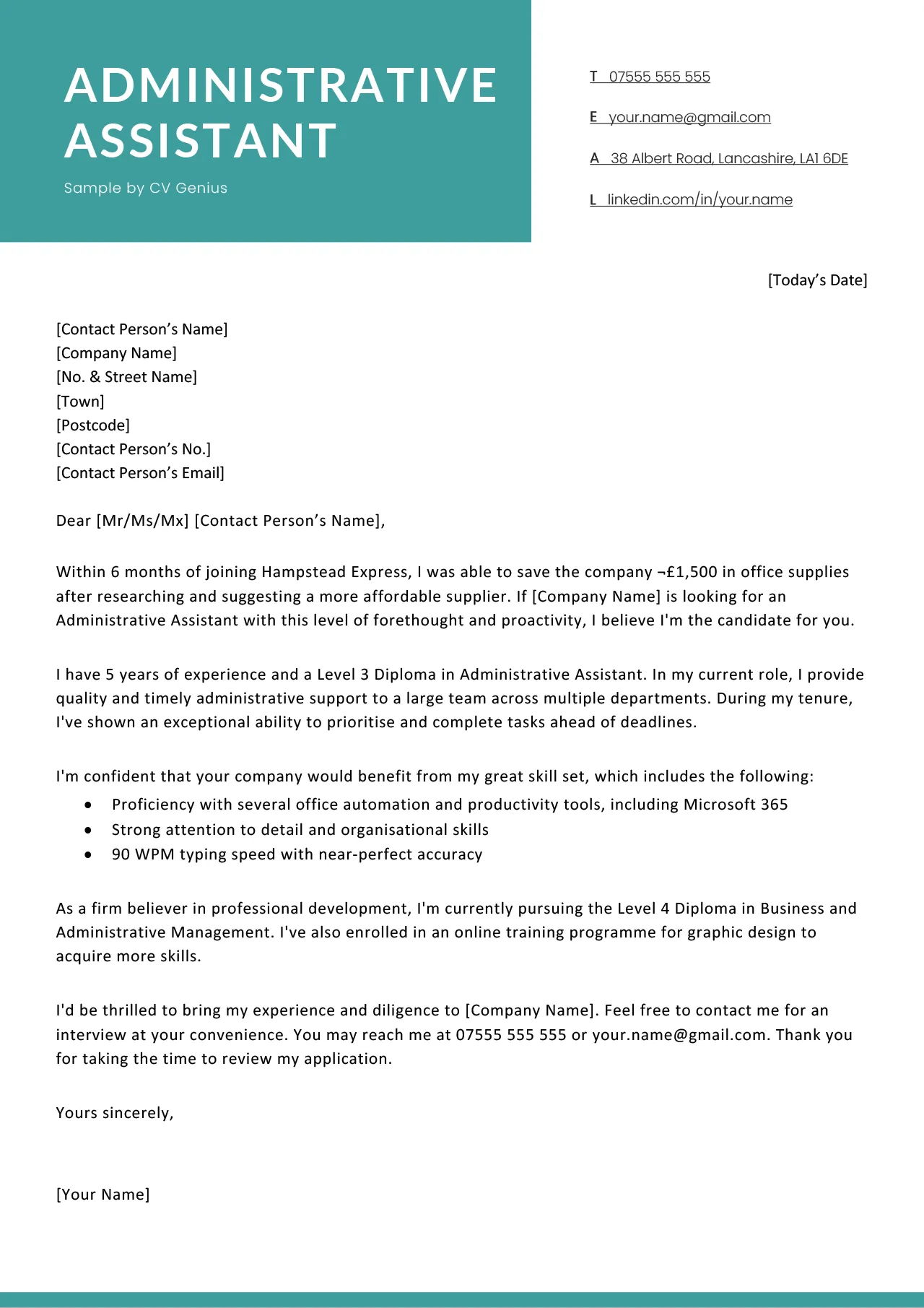
Express your enthusiasm for the opportunity and the company. Explain why you are interested in the role and what attracts you to the company’s mission or values. Be sincere and show that you are genuinely excited about the prospect of joining their team. Enthusiasm is contagious and can leave a lasting positive impression. Demonstrate your eagerness to contribute to the company’s success and explain why this particular role aligns with your career goals. Your passion will show in your writing, and the hiring manager will notice your eagerness to learn and contribute to the team.
Concluding Your Cover Letter
In the closing paragraph, summarize your key qualifications and reiterate your interest in the position. Thank the hiring manager for their time and consideration. Include a call to action, such as expressing your eagerness to discuss your qualifications further in an interview. Make sure your closing is professional and leaves a positive final impression. Your conclusion should be concise, leaving the hiring manager with a clear understanding of why you’re the best candidate. Always end with a professional closing and your signature.
Proofreading and Formatting Tips
A polished and well-formatted cover letter demonstrates professionalism and attention to detail. Proofreading and formatting are essential steps that can significantly enhance your chances of success. Always make sure your document is free of errors and easy to read. Pay attention to grammar, spelling, and sentence structure, because these details reflect your skills and abilities to communicate. A well-formatted letter helps the reader understand the information without distractions. Be sure to use a clear and readable font, proper spacing, and consistent formatting throughout.
Importance of Proofreading
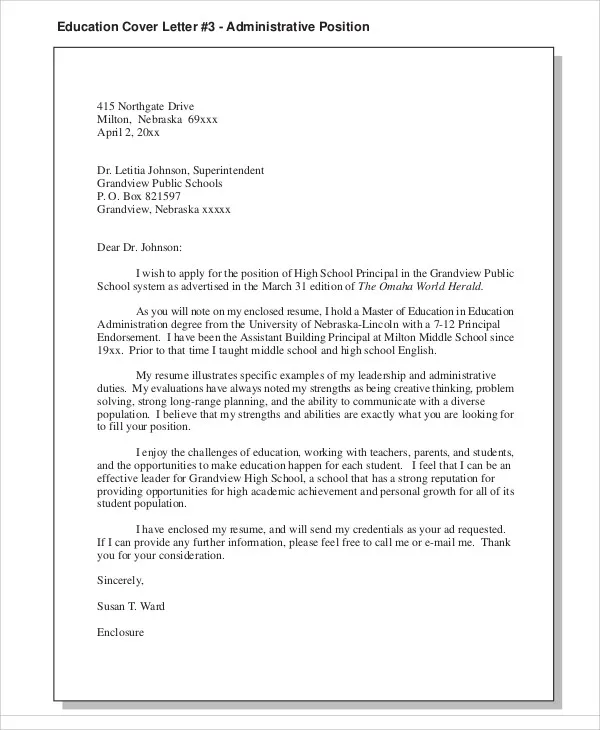
Proofreading your cover letter is critical. Typos and grammatical errors can undermine your credibility and make you appear careless. Read your letter multiple times, and ideally, have someone else review it. Use spell-check and grammar-check tools, but don’t rely on them completely. Proofread for clarity, conciseness, and flow. Errors, even minor ones, can lead to the rejection of your application. Proofreading ensures that your cover letter presents you as a meticulous and attentive individual, showing your attention to detail. Proofreading is an essential step and an investment of time that can significantly affect your application.
Formatting Guidelines
Use a professional font like Times New Roman, Arial, or Calibri, with a font size between 10 and 12 points. Use standard one-inch margins and single-space the body of your letter. Keep your letter concise; ideally, no more than one page. Use clear headings and bullet points to break up large blocks of text and make your letter easy to read. Ensure consistent formatting throughout the document for a polished appearance. Clear formatting improves readability, making your key information easily accessible to the hiring manager. Proper formatting demonstrates attention to detail, a vital skill for administrative roles. Review the guidelines to make sure your formatting is consistent.
Action Verbs to Use in Your Cover Letter
Using strong action verbs can make your cover letter more dynamic and engaging. They demonstrate what you have achieved in past roles. Action verbs help you highlight your skills and accomplishments. They help paint a picture of your experience and demonstrate your capabilities. Action verbs not only make your cover letter more compelling, but also highlight your ability to take initiative and drive results. Choose verbs that accurately reflect your contributions and align with the job’s requirements.
Action Verbs for Skills
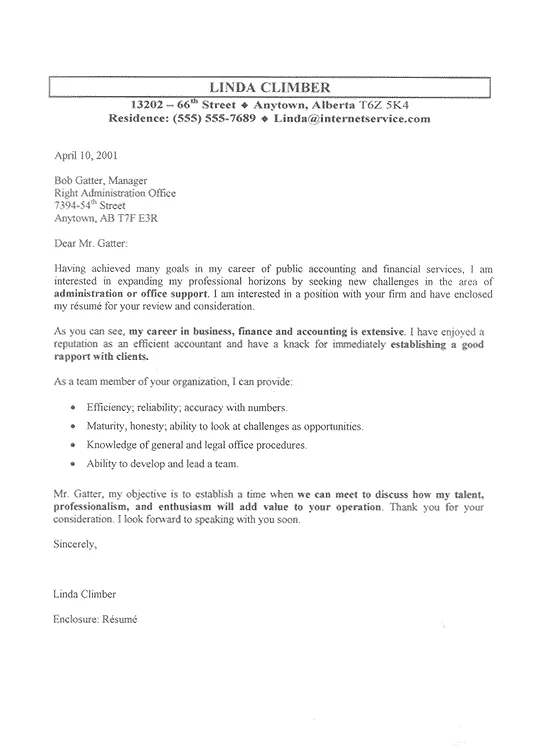
When describing your skills, use action verbs that show how you utilize them in a practical setting. Examples include “managed,” “coordinated,” “implemented,” “organized,” “facilitated,” “maintained,” “resolved,” “communicated,” and “collaborated.” For instance, you might write, “Managed a team of five administrative assistants” instead of “Responsible for managing a team.” Using active verbs brings your experience to life. Employ action verbs to showcase how you used your skills to impact your previous workplaces positively. Action verbs are a great way to highlight your skills and demonstrate how you have applied them effectively to get results.
Action Verbs for Achievements
To highlight your achievements, use action verbs that focus on results. Examples include “achieved,” “increased,” “reduced,” “improved,” “streamlined,” “generated,” “implemented,” and “saved.” For instance, you might write, “Streamlined the invoicing process, reducing processing time by 20%” instead of “Responsible for streamlining the invoicing process.” Using these results-driven verbs gives tangible proof of your skills and contributions. Use action verbs to give the recruiter concrete examples of your accomplishments. Quantify your achievements to show your impact on the companies where you have worked.
Common Mistakes to Avoid
Avoiding common mistakes can greatly improve the quality of your cover letter and increase your chances of getting hired. Familiarize yourself with common pitfalls. Generic, impersonal cover letters won’t capture the recruiter’s interest and will likely be ignored. Pay close attention to these details and you’ll be well on your way to writing a winning cover letter.
Generic Cover Letters
Avoid sending generic cover letters. Tailor each letter to the specific job and company. Generic cover letters fail to demonstrate your interest in the specific role and company, making it less likely to make a lasting impression. Research the company and highlight how your skills and experience align with their needs and values. Show that you’ve put in the effort to understand the position and why you’re a good fit. Make sure your letter shows you have an authentic interest in the specific job opportunity. A generic letter suggests that you are sending the same information to multiple companies, which is not appealing to the hiring manager.
Typos and Grammatical Errors
Typos and grammatical errors can damage your credibility. Always proofread your cover letter carefully. Errors create a negative impression and may make you appear careless or inattentive to detail. Proofread multiple times, use spell-check and grammar-check tools, and ideally, have someone else review your letter. Ensure the quality of your written communication reflects the high standards required in an administrative role. Paying attention to detail will help you convey professionalism. Make sure your cover letter is free of mistakes and is as perfect as possible.
Lack of Research
Failing to research the company and the role is a critical mistake. You must demonstrate that you understand the company’s mission, values, and the specific requirements of the job. Customizing your cover letter to show you’re interested makes your application stand out from the rest. Research the company, understand the role, and highlight how your skills align with the job’s requirements. Show the hiring manager that you’ve taken the time to learn about them. By demonstrating this level of effort, you make your application more engaging and increase your chances of moving forward.
Finalizing Your Administrative Cover Letter
Finalizing your administrative cover letter involves several steps. Before submitting your application, carefully review your cover letter and make sure it is free of errors. Ensure that your contact information is accurate, and tailor your letter to the specific job posting. Always proofread the letter before submitting. Your cover letter is an essential document in your job application. To ensure it is perfect, you need to pay attention to every detail. Your cover letter is your chance to demonstrate how you can contribute to an organization’s success. If you do these things, you’ll be able to present yourself as a highly qualified candidate.
